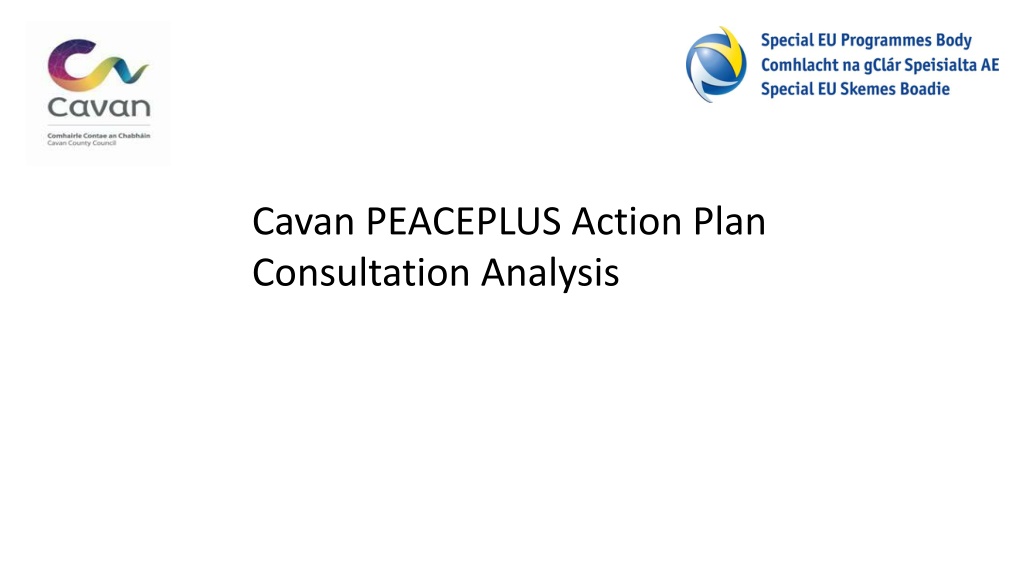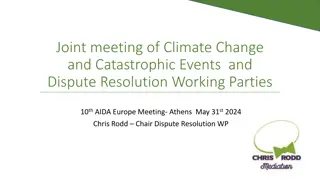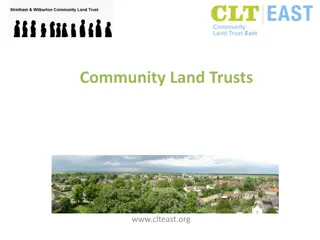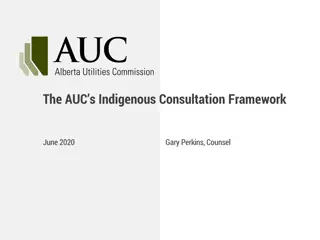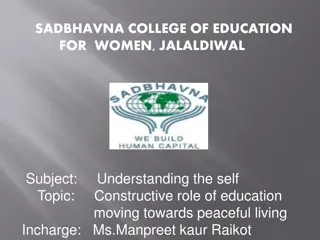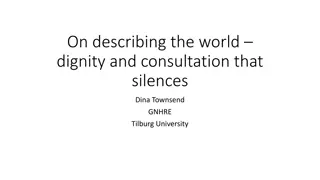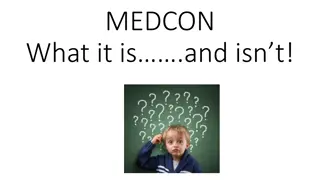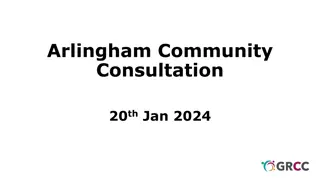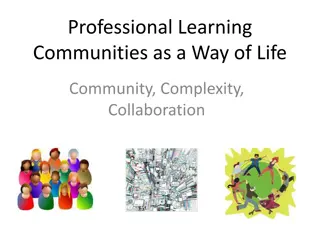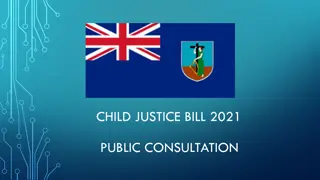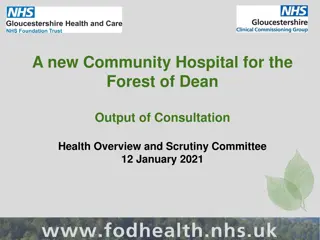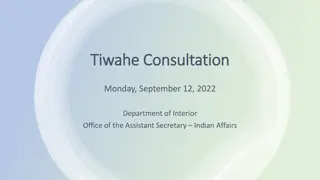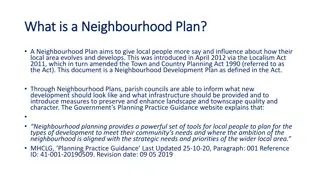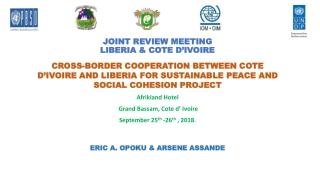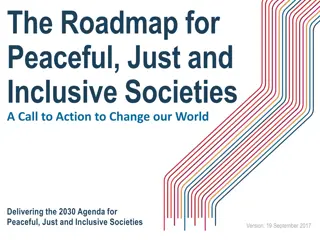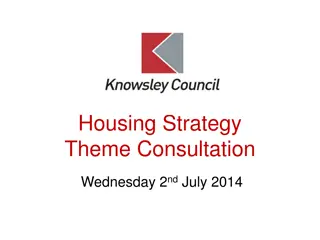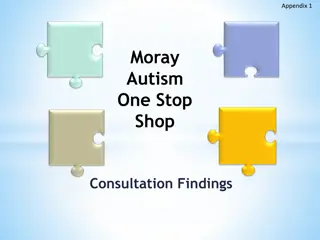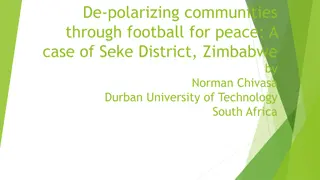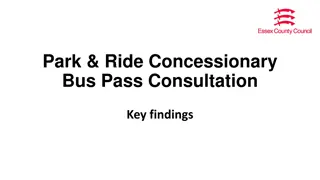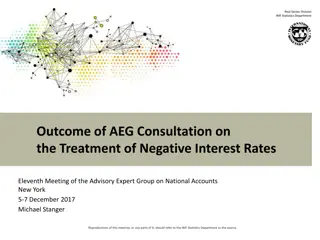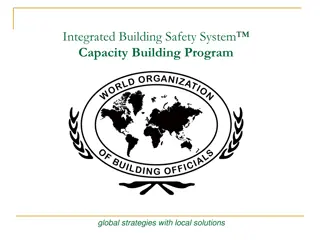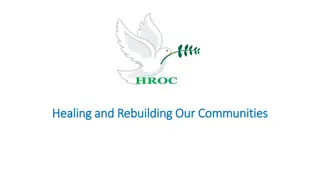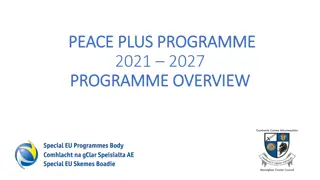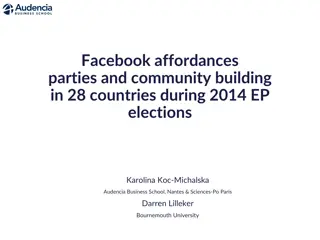Community Consultation Analysis for Building Peaceful Communities
Analysis of consultation findings on priorities, barriers, and actions for fostering peaceful and thriving communities. Insights from focus groups, surveys, and public meetings highlight key areas like involving young people, community spaces, addressing anti-social behavior, and more. The report also identifies challenges such as lack of staff, understanding, and engagement due to the COVID-19 pandemic.
Download Presentation

Please find below an Image/Link to download the presentation.
The content on the website is provided AS IS for your information and personal use only. It may not be sold, licensed, or shared on other websites without obtaining consent from the author. Download presentation by click this link. If you encounter any issues during the download, it is possible that the publisher has removed the file from their server.
E N D
Presentation Transcript
Cavan PEACEPLUS Action Plan Consultation Analysis
Focus Groups Survey 122 participants 200 replies Councillors Public meetings 12 participants 45 participants
Most important priorities for building peaceful and thriving communities Top 6 answers: 1. Involving young people in community activities and building new friendships with others 2. Bringing people together to address common issues i.e. Mental health, unemployment, environmental programmes etc 3. Creation of new/additional community spaces which are open to all 4. Dealing with Anti-social behaviour 5. More opportunities/support for community activities engaging older people Involving minority communities in community life and activities 6.
Biggest barriers to community integration and cohesion Top 5 answers: 1. Lack of staff/community volunteers to undertake community activities 2. Lack of interest in communities 2. Lack of understanding and respect for others of different cultural backgrounds, religious/political belief, ability or sexual orientation 4. Lack of information/promotion of cross community activities and events 5. Impact of COVID-19 pandemic increasing isolation/preventing people from becoming engaged in community activity
Top 5 answers: 1. Development of more shared use of existing community spaces 2. Development of new/additional indoor community spaces to increase cross community interaction 3. Development of new/additional outdoor community spaces to increase cross community interaction 4. Activities which aminate community facilities and encourage wider access and participation 5. Development of social Activities/ actions should be included in the Action Plan for local community regeneration and transformation Top 5 answers: 1. Development of more shared use of existing community spaces 2. Development of new/additional indoor community spaces to increase cross community interaction 3. Development of new/additional outdoor community spaces to increase cross community interaction 4. Activities which aminate community facilities and encourage wider access and participation 5. Development of social enterprise spaces enterprise spaces
Top 5 answers: 1. Activities for older people/vulnerable residents 2. Development of cross community activities of common interest i.e. health and well being activities, arts activities, sports activities, family activities etc 3. Education programmes tackling issues related to self-esteem, bullying, cyber safety and appropriate use of social media Activities/ projects should be included in the Action Plan to build/ sustain thriving and peaceful communities 4. Enhanced cross community youth activities i.e. through youth centres, drop in programmes, sport/arts/cultural activities 5. Volunteer development/leadership programmes
Top 6 answers: 1. Multi-cultural events/festivals 2. Education programmes for children on cultural traditions within our community 3. Increased opportunities for joint activities between community organisations of different cultural backgrounds 4. Cultural diversity awareness training 5. Community exhibitions on culture and heritage 6. Language training opportunities inc; Irish language, Ulster Scots and English language courses for those who don t have English as a first language Activities/ actions should be included in the Action Plan to ensure understanding and celebration of culture and heritage in our community
Public meetings & focus groups Location Date Time Participants 16th February Cavan Town Morning 6 16th February Cavan Town Evening 6 16th February Cavan Town Afternoon 12 -Councillors 20th February Ballyjamesduff Evening 15 22nd February Cavan Town Morning 10 - 4c s MC group 22nd February Cavan Town Afternoon 32 CCC staff 22nd February Cavan Town Afternoon 13 Older peoples council 22nd February Cavan Town Afternoon 23 - Stakeholders 22nd February Cavan Town Afternoon 5 Comhairle na nOg 22nd February Cootehill Evening 18
Public meetings & focus groups completed Location Date Time Participants 9th March Telephone conversation Morning 1 Local link 9th March Telephone conversation Afternoon 1 Citizens information 10th March Telephone conversation Afternoon 1 Teach Oscail 13th March Zoom Morning 9 - LDC 14th March Teams Morning 6 - Disability network 14th March Zoom Afternoon 7 - Traveller Focus group 24th March Cavan Town Morning 17 - Economic element (LECP)
Theme 1 Community Regeneration & Transformation Top 5 answers: 1. Development of more shared use of existing community spaces 2. Development of new/additional indoor community spaces to increase cross community interaction 3. Development of new/additional outdoor community spaces to increase cross community interaction 4. Activities which aminate community facilities and encourage wider access and participation 5. Development of social enterprise spaces Project ideas: Capital Improvement Programme to upgrade existing community spaces bringing them to a higher standard and increasing cross-community interaction. An Outdoor Recreational Capital Programme to enhance existing spaces as a welcome space for all communities. Capital Programme to enhance Youth facilities/outdoor space in town s with no youth facility e.g. smart youth shelters. A community focused Shared Spaces Animation Programme to enhance/transform Council / community owned unused green space e.g., community gardens, picnic/seating areas, art features etc.
Theme 2 Thriving and peaceful communities Project ideas: Historical focused programme focusing on topics of common/shared interests & legacy issues e.g. history of our local villages & towns, railways, waterways, famine etc. Top 5 answers: 1. Activities for older people/vulnerable residents 2. Development of cross community activities of common interest i.e. health and well being activities, arts activities, sports activities, family activities etc 3. Education programmes tackling issues related to self-esteem, bullying, cyber safety and appropriate use of social media 4. Enhanced cross community youth activities i.e. through youth centres, drop in programmes, sport/arts/cultural activities 5. Volunteer development/leadership programmes A county-wide Health and Well-Being Initiative . A co-designed Local Cross-Community Activity Plan to complement each of the Capital Programmes and bring youth groups together in joint activity. Youth Programme e.g. sports, drama, arts, summer schemes that include tackling issues related to self-esteem, bullying, cyber safety and appropriate use of social media Volunteer Capacity Building and Training Programme with emphasis on recruiting young volunteers, leadership training & networking / partnership working.
Theme 3 Building respect for all cultural traditions Project ideas: Celebration of Arts, Music, Heritage, Culture focused Programmes through delivery of workshops, festivals, exhibitions, publications, events etc. Top 6 answers: 1. Multi-cultural events/festivals 2. Education programmes for children on cultural traditions within our community 3. Increased opportunities for joint activities between community organisations of different cultural backgrounds 4. Cultural diversity awareness training 5. Community exhibitions on culture and heritage 6. Language training opportunities inc; Irish language, Ulster Scots and English language courses for those who don t have English as a first language Programmes to integrate Newcomer communities into our local communities and for our communities in turn to learn more about their own and other cultures. English Support Programmes (in a non-formal setting) for Newcomer communities
Discussion: 1. Thoughts? 2. Identify gaps 3. Stage 2 consultations
